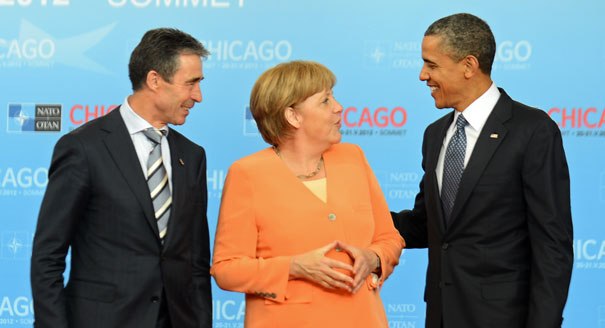Registration
You will receive an email confirming your registration.
As NATO decreases its involvement in Afghanistan and Libya and Washington shifts its attention to Asia, the future of U.S.-European transatlantic security has become a matter of debate amongst policymakers. They wonder whether the United States will remain committed to its allies’ security and vice versa, or whether differing regional priorities will undermine the effectiveness and bonds of the transatlantic relationship.
The Carnegie-Tsinghua Center for Global Policy invited Stephen Flanagan, the Kissinger Chair of Diplomacy and National Security at the Center for Strategic and International Studies, to discuss the perspectives from Washington regarding the evolution of transatlantic relations. This event was co-hosted with the Royal Norwegian Embassy in Beijing.
Strategic Vision
The chief issues for current transatlantic relations, stated Flanagan, are terrorism and regional instability.
- Transatlantic Alliance Will Continue: Flanagan stated that the future of the U.S. transatlantic relationship was bright. He explained that the pivot to Asia was not a reflection of the United States turning away from Europe. Continued transatlantic cooperation, Flanagan emphasized, benefitted both regions’ efforts to safeguard global rules and maintain norms in trade and foreign assistance.
- Does Trade Trump Politics? Flanagan explained that rising instability and security concerns around the world trump the potential for strong trade ties to maintain peace and prosperity. He cited the increasing focus on issues like tensions on the Korean Peninsula. Such tensions can impede trade and disrupt norms, impeding stability in the transatlantic relationship.
- Potential Paralysis: In addition, Flanagan said that Europe and the United States are adopting differing priorities in combating terrorism. The most prominent example of this is the French preoccupation with Islamic insurgents and problems in North and West Africa. A European attaché representative added that the stubborn U.S. response to North Korea diverges from Europe’s stance as well. However, Flanagan responded that the United States and Europe are actually not fundamentally divided and that policymakers on both sides of the Atlantic realize the pressing nature of instability in these regions and their repercussions for global stability.
Security Cooperation in the Middle East and Afghanistan
Instability in the Middle East and Afghanistan still occupies top of the security agenda of the U.S. transatlantic relationship, Flanagan said.
- Hypotheticals Remain in Afghanistan: While the United States actively seeks disengagement from Afghanistan, a number of questions pertaining to the post-2014 forces remain unanswered. Flanagan noted that the overall mission of any International Security Assistance Force (ISAF) post-2014 is uncertain. He added that it was unclear whether the post-2014 U.S. assistance to Afghanistan would be robust and whether non-U.S. forces would remain in Afghanistan through NATO.
- Syria and the Iran Factor: Given the close alliance between Syria and Iran, Flanagan explained how the key issues in both countries were linked. Syrian President Bashar al-Assad’s continues to oppose international mediation in the ongoing conflict. This resistance to external mediation, Flanagan explained, does not bode well for the international community’s attempts to negotiate an end to Iran’s nuclear problems.
- A Complex Security Web: As security concerns become increasingly complicated, Flanagan explained that NATO is debating whether the organization should adopt large-scale missions in the future or conduct smaller initiatives. He described NATO as an organization fronted by states with outdated defense commitments. In addition, Flanagan cautioned that the sequester in the United States might also prompt U.S. defense cutbacks in NATO.
Implications of U.S. Pivot to Asia for Transatlantic Relations
As U.S. Asian allies call for an increased American presence in the region, its European allies question how this will impact the traditional stronger transatlantic relationship, Flanagan said.
- How Does Europe Fit In: Flanagan explained how Washington has no expectations for European naval engagements around Taiwan, the South China Sea, and the Indian Ocean. He noted that the pivot created the opportunity for naval cooperation between Europe and smaller East Asian navies. However, Flanagan stated that the United States did not expect Europe to enter into new, major military engagements in Asia.
- China and the Transatlantic Relationship: While Beijing may view the U.S. pivot as a threat to Chinese security and a form of containment, Flanagan explained that some European powers remain more concerned about the strength of their partnership with the United States.
Discussants: Li Weiwei, Su Hao
